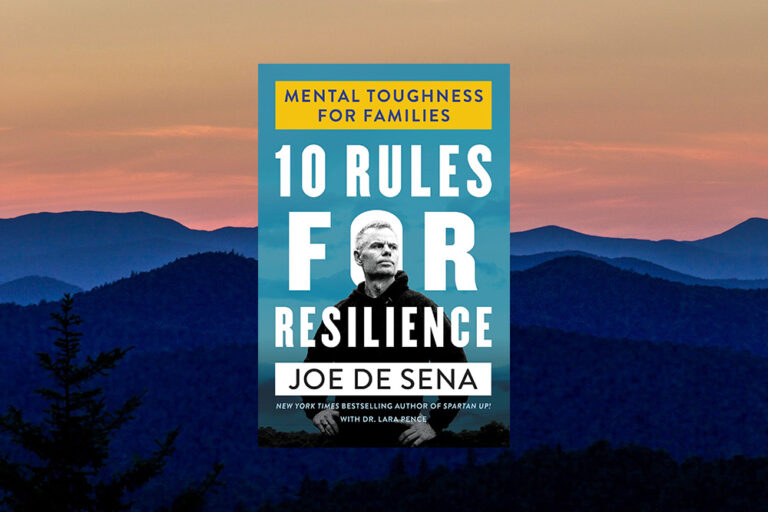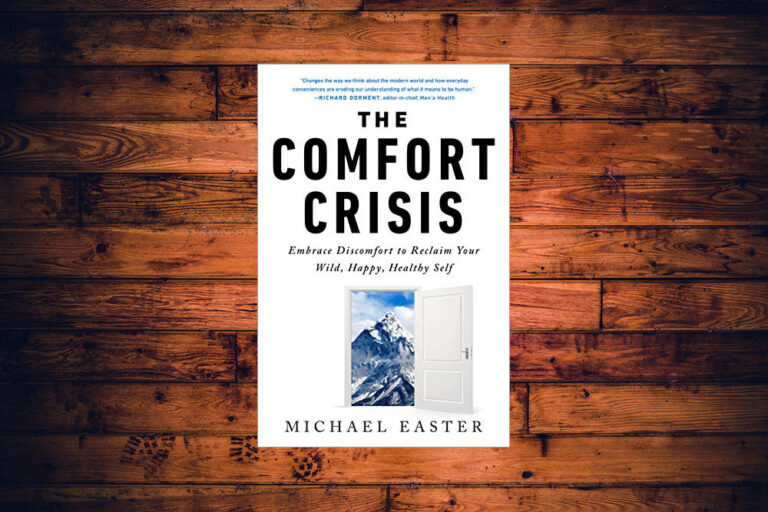#17: Staying Out of Your Comfort Zone. Observations From “Living With a SEAL” by Jesse Itzler (Part 3)

Today’s article is the last part of my notes from Jesse Itzler’s book Living With a SEAL: 31 Days Training With the Toughest Man on the Planet. It’s Jesse’s memoir in which he recounts December of 2010 when he lived and trained with David Goggins (here’s the first part of my notes from David’s book Can’t Hurt Me).
David threw countless crazy challenges at Jesse. As Jesse explored his limits, he had many life-changing realizations. We’re going to cover them today as we discuss the importance of staying out of one’s comfort zone.
(Side note: if you want to learn more from David Goggins, I created a list of the best interviews featuring David Goggins.)
Avoid the Predictable
“Your runs are too predictable,” SEAL says as he stares at me stone-faced.
“Predictable?”
“Yeah, motherfucker… predictable. It’s like your legs know what’s coming next. It’s making shit too comfy. Your body is used to your bullshit jogging routine. Gear up and meet me in five; we’re doing intervals.”
Some level of predictability is necessary to improve. But when you’re used to a specific way of exercising with no variety ever, as Goggins says, “it’s making shit too comfy.”
So switch it up every now and then.
As a long-distance runner, try hill sprints or interval training.
As a bodybuilder, try some gymnastics exercises or go rock climbing.
As a team sports player, try an individual sport like MMA or surfing.
You may also vary specific exercises you do. For example, instead of regular push-ups try diamond push-ups, pike push-ups, or plyometric push-ups. Or instead of barbell squats, try split squats, air squats, or walking lunges with a sandbag.
This advice applies to pursuits other than sports, too.
If you’re learning a foreign language through an app, have an online class with a native speaker, record yourself describing your day, or watch a movie in your target language.
If you’re an entrepreneur, explore other ways to market your business that you don’t feel as comfortable pursuing.
In a relationship, come up with a creative date idea or do something positive your partner would never imagine you’d be capable of doing.
Stepping outside your comfort zone doesn’t always mean doing the same thing but harder. Variety can also provide a valuable challenge that will help you grow.
If It Doesn’t Suck, We Don’t Do It
“Man, my legs are really messed up. It feels like a knife is in my calf,” I complain. “Like I can cramp any second.” I grab my leg and walk stiff-legged, keeping my legs totally straight like Herman Munster from The Munsters.
“Perfect,” SEAL says. “There’s only one rule in training: If it doesn’t suck, we don’t do it.”
A more common refrain for modern men addicted to comfort would be “if it sucks, we don’t do it.” When something becomes difficult, uncomfortable, let alone causes plain suffering, the vast majority runs the other way. Because of their low tolerance of discomfort, they never get to the finish line.
David Goggins has built his mental toughness through doing the hardest things he could find. Whether it was becoming a Navy SEAL, participating in gruesome ultra-marathons, or breaking pull-up records, he welcomed whatever sucked.
It was these excruciating things that have forged Goggins into who he is. He became exceptional because he’s done things that few people are willing to do.
When we do things that suck we not only develop our coping skills but also change our perspective. Minor annoyances don’t bother us while big challenges no longer overwhelm us as before.
Does doing things that suck sucks? Of course it does. There’s no way to avoid that. But as we face that deep discomfort, we grow. And that’s one of the most rewarding feelings in life that more than makes up for the struggle.
Brutally Hard Things Are Great
It’s so hard that even SEAL can’t go straight to ten without dropping to his knees after the sixth set. Yet all he keeps saying is: “This is great.”
This is not great. This is brutally hard.
The brutally hard thing in question was doing fifteen sets of ten push-ups with a 50-pound (22.5 kg) vest.
This interaction yet again demonstrates Goggins’s devotion to doing things that suck.
Whatever is brutally hard for Jesse is great for Goggins. Why? Because Goggins likes to meet his match. He knows that facing hard challenges makes him better.
I recently started a new workout plan that includes an exercise called Zercher sandbag carry. The exercise is simple: you grab a heavy sandbag and carry it in your arms like a baby for a few minutes.
Because of an injury that forced me to take several weeks off upper body strength exercises, I had gotten weak. The first time I did this exercise, with each minute of walking it got harder and harder until it got brutally hard. I moaned like a little bitch, willing the time to go faster. Yes, it was that ugly.
After I finished, my arms were numb. It felt as if they turned into stone. Physically I was wrecked. But mentally, I was pumped up.
“That was one mean motherfucker of an exercise!” I nodded to myself. My girlfriend looked at me (I was doing the workout at home) and said: “you’re not right in the head.”
Yes, Goggins did rub off on me a bit.
Stay Hungry
I noticed yesterday I haven’t seen SEAL eating at all. I mean… as in nothing since he’s been here. That’s seven days and three meals a day and I haven’t seen him eat a single bite.
But it’s Sara who asks, “SEAL, are you on a diet?”
“Nah, I just like to go to sleep hungry… so I wake up hungry. Life is all about staying out of your comfort zone.”
Fasting is one of the easiest and most rewarding ways to stay out of your comfort zone. Abstaining from food shows you how addicted the modern world is to it. Our days are often dictated by when we’re going to eat, where we’re going to eat, what we’re going to eat, and with whom we’re going to eat.
Eating too much and too often has resulted in a huge problem causing millions of preventable, premature deaths each year. If only some of those people cultivated some voluntary discomfort every day…
While proper fuel is necessary for optimal performance, we don’t need to obsess about food so much. Nothing bad is going to happen if you skip a meal or two. And no, you aren’t “starving” just because you haven’t eaten for a few hours.
Fasting can make you develop a healthier relationship with hunger and make you more grateful for the food you have. Many people report that fasting gives them a mental edge, too.
Fasting has been an inherent part of my life for over ten years. Each day I fast for at least 16 hours, and a few times a week up to 20-24 hours. A few times a year I do prolonged fasts of at least 40+ hours. I’ve also done some 3-day fasts. And yes, I do almost all of my workouts on an empty stomach.
I can’t imagine any other way of eating, and I think that everyone should experiment with it. Even if you decide not to fast every day, it’s still a valuable exercise for cultivating voluntary discomfort.
Train Your Limits
Meanwhile, I’m so sore from all of the push-ups I can’t even wash my hair.
SEAL doesn’t care, nor is he very concerned.
“If you want to be pushed to your limits, you have to train to your limits. If you get hurt, you will recover. What the fuck is the problem?”
Having completed incredible feats of strength and endurance, David Goggins is an excellent example of what the body can withstand and recover from.
But as impressive as it is to keep going despite a battered body, voluntary discomfort isn’t about self-destruction. Instead, it’s about consistently training your limits.
With a long time horizon, you need to be smart about recovery and about how hard to push yourself each time. You can’t go so hard that you can’t repeat it the next day but you shouldn’t take it too easy, either.
When I start a new workout routine, I sometimes catch myself thinking “oh, this will get easy with time.” That’s a big mistake: if you train your limits, a hard workout should never become easy. If it does, it’s no longer training. It’s maintenance.
The same applies to mental pursuits. If something gets too easy, it means we’ve mastered it and it’s time to figure out how to push our limits further.
To become exceptional, we need to continuously explore the edges of our comfort zones. Thankfully, these limits are malleable. All it takes to push them further away is some voluntary suffering.
You Discover What You’re Capable of Through Doing It
One thousand push-ups!
In one day. Holy shit! I take a seat on my couch by the steam room and smile. For the first time during this whole process, I’m truly proud of myself. Not because I did a thousand but because I stuck with the journey. I think back to the first day SEAL was here and the first set of push-ups we did. This proves to me that if you push the body, the body will respond.
Jesse’s remark is interesting because in theory we know that if you push the body, it will respond. That’s how all exercise works: we challenge our bodies to do something hard and they bounce back stronger.
Yet, there’s a vast difference between knowing something in theory and experiencing it yourself.
Thanks to Goggins’s guidance, Jesse discovered that he was capable of completing 1,000 push-ups in a single day. He also internalized the fact that if he pushed his body over a period of time, it would respond with increased strength and endurance.
Experiences like this can change one’s outlook on what’s possible. If our bodies can get so strong over time that we can complete 1,000 push-ups in a single day, what more can they adapt to?
What if your body could adapt to running ultra-marathons?
What if it could dive 100 feet (30 meters) on a single breath?
What if it could climb at high altitudes?
What if it could learn how to tolerate cold water?
And what if our brains are the same?
What if you could become a polyglot?
What if you could master emotional control?
What if you could train your mind to reject procrastination and get to work right away?
What if you could radically expand your ability to learn new things?
Realizations such as these can come only through consistent dedication to the process.
Our bodies and brains respond to the challenges we give them. Why not use this superpower to grow our abilities?
Ultimately, It’s All About Training Your Brain
I understood on a deeper level how SEAL trained my mind as much as my body. With his challenges of jumping in a frozen lake, the steam room episode, and all of the madness in between, what we were really doing was just exercising my most important muscle—my brain. Specifically, my mental toughness muscle. I learned that by constantly doing things that are hard and making myself uncomfortable, I improve my ability to handle obstacles. I get comfortable being uncomfortable—and that’s real mental toughness.
The persistence and perseverance to achieve a long-term goal is a key driver to success. I’ve always had that blueprint, but SEAL helped me redefine success—Never Quit. And by constantly putting myself in situations that are challenging, I’ve created an environment in my head that makes me want to keep going even when things get ridiculously hard. In these situations, I have trained myself not to quit, but to attack. Thanks, SEAL.
The quote above is so perfect that I have little to add here. I found it a fitting conclusion to my three-part series on Jesse Itzler’s book Living With a SEAL: 31 Days Training With the Toughest Man on the Planet.
We can talk about push-ups, running long distances, or fasting all day long. But ultimately, these are all tools to train our brains. Real mental toughness isn’t defined by your body. It’s defined by your ability to handle whatever life throws at you.
Yes, we should keep our bodies strong as they enable us to do a lot of things. But when we quit, often it’s not because our muscles fail but because our mind gives up. That’s why training the brain—through doing uncomfortable and sometimes unpredictable things that suck—should take precedence.
Questions to Ponder
1. Are your workouts and other projects where you push yourself predictable? How often do you switch things up to test yourself in something different?
2. What is one thing that sucks that you could do that you know would help you become better?
3. When you voluntarily deal with brutally hard things, do you complain about them or are you happy that you’ve met your match?
4. What is your relationship with hunger? Can you tolerate it for prolonged periods of time without letting it affect your performance?
5. Do you consistently train your limits, adjusting the level of difficulty when things get easy?
6. What is one thing you’d love your body or mind to get adapted to? How could you train it?
7. What were the mental toughness lessons you derived from the three most recent challenges in your life?
If you want more advice on how to stay out of your comfort zone, sign up for a free weekly Discomfort Club newsletter. Enter your email address below:




